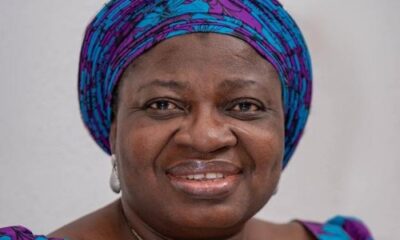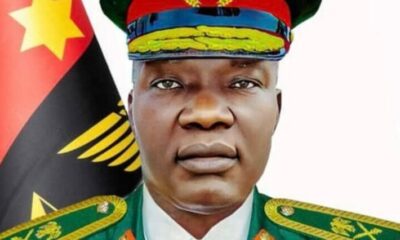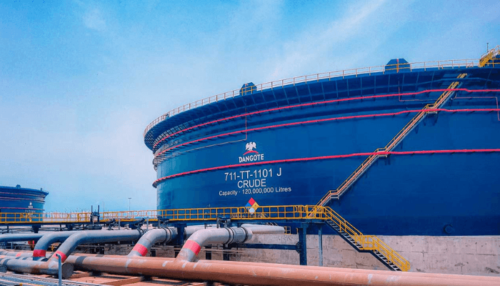The Dangote Petroleum Refinery has warned that it may export its Premium Motor Spirit (petrol) if Nigerian National Petroleum Company Limited (NNPCL) and local petroleum dealers refuse to purchase it.
Devakumar Edwin, Vice President of Oil and Gas at Dangote Industries Limited, made this statement on Monday’s Brekete Family live show.
Edwin, who confirmed that the refinery has started the production of petrol, said local oil traders have resorted to importing diesel and aviation fuel, blocking local sales of Dangote fuel.
“We have been exporting aviation fuel, we have been producing kerosene, we have been producing diesel, but yesterday, we started the production of PMS. So, that was the last stage. The only thing now left out is petrochemicals.
“So, the good news for the country is we have started producing PMS from our refinery since yesterday (Sunday),” he confirmed.
Asked if the petrol would be sold locally, Edwin replied, “Well, I explained how there has been a kind of a blockade from lifting our products within the country. The traders have been trying to block (it), and so now we have been exporting our petroleum products. PMS, we are ready to pump in as much as possible to the country.
“But if the traders or NNPC are not buying the product, obviously, we will end up exporting the PMS as we are doing with the aviation jet and diesel,” he declared.
Edwin expressed surprise that the company started facing different challenges it never expected when the refinery was set to commence operations.
He recalled that the philosophy initially was to add value to the raw materials available in the country, regretting that Nigeria is still exporting crude and importing refined petroleum products after over three decades.
“The philosophy is to take the crude, and instead of exporting the crude, refine it, add value; export the finished products, and supply the finished products locally. But unfortunately for us, we started facing challenges with the crude supply.
“What is happening today? We are struggling to get the crude. We are now importing the crude from the US, we are importing from Brazil, and from other parts of the world. So, the whole philosophy has gone upside down. After all these decades, we are exporting crude, importing products,” he added.
He stated further, “The same thing is continuing. We are not getting enough crude allocation, and the crude is still being exported. We are forced to import crude from outside. Yes, we are getting some crude locally, but it’s not adequate.”
Commenting on the laws governing domestic crude supply obligations, he said, “As per the laws, no crude can be exported, unless all the local refineries requirements are met. That is specified in the Petroleum Industry Act. But we are struggling to get the crude.”
He revealed that the company has started the construction of four crude tanks of 120 million litres capacity each to store imported crude due to low local supply.
“In fact, if you see the refinery, we are building four new crude tanks, each of the tanks has 120 million litres capacity. We have to construct the tanks because we are not getting the local crude. We import from overseas, which means we should have enough stocks due to the shipping time,” he maintained.
Despite having a gantry that can load 2,900 tankers per day, Edwin disclosed that the refinery has not loaded up to 5 per cent of the gantry’s capacity owing to low local patronage.
“Go and see our product gantry, we can load 86 tankers at any given time. We can load 2,900 tankers of petroleum products every day, but we are not even loading five per cent, because those who are interested in the trading business, feel that probably this local production is going to affect their established interest, so they are not allowing our products to be sold locally.
“They are not coming to lift our products. So, what are we doing? We are exporting the products.
“Yes, the refinery can survive, we can import the crude, we can export petroleum products, and we can survive. But is that why he invested in the refinery?” he queried.
On fuel quality, Edwin noted that the refinery has the best laboratory in the world, boasting “No refinery can come and challenge that they have more equipment than us,” he stated.
He added that the petroleum refinery has adopted what he called the Euro 5 grade, saying this is the grade which is acceptable in Europe or the US.
“Our product can be exported to any part of the world, the best in quality, the lowest in sulphur. In terms of pollution, we have no pollution. So, we are producing the best quality products. That is how we are already exporting our product.
“Our aviation jet fuel has gone to Europe, and we are exporting our diesel. So, the refinery has been successfully launched and producing the products,” he added.
The Dangote boss disclosed that one of the philosophies of the business is that wherever it is going to operate, the business should be highly environmentally friendly.
And then, also, every business we go in, we focus on the cost of production and the energy efficiency. And the same thing, philosophy, has been adopted here. So, as we start producing, we find that the energy costs are the lowest.
The vice president expressed concern that some people still accuse the President of the Dangote Group, Aliko Dangote, of being a monopolist, saying the founder was in business to create wealth and job opportunities, even while making profits.
He disclosed that the money being made by Dangote is being reinvested into the country, creating more wealth in the country, and adding to the Gross Domestic Product.
“So, we invest our profits and borrow, and we are investing. This is how Alhaji Aliko has been investing in businesses.
“We are making money, yes, but where is the money going? It is not going to Dubai, it is not going to Switzerland, to some bank accounts. It is not going to buy properties. When I joined him in 1991, Alhaji Aliko had a house in the United States, he had a house in the United Kingdom; everything is sold today, and he is still living in his 35-year-old house.
“He has not even added more houses within the country. Everything he’s putting into manufacturing, creating employment and creating wealth, and yet he is being called a monopolist,” he stated.
Industry sources confirmed to our correspondent on Sunday that the Dangote PMS would hit the market soon.
The sources, who pleaded anonymity, told our correspondent that the government and the Dangote Group are working out modalities for the circulation of the product.
A government source hinted that the sale and distribution of the PMS is being sorted out with the Federal Government.
The source added that only the NNPC would be authorised to sell the Dangote fuel at the moment.
Recall that the Dangote petrol was supposed to have been out since June, but the refinery battled crude shortage and entered into a brawl with the Nigerian Midstream and Downstream Regulatory Authority, which accused the refinery of producing substandard diesel.
The intervention of the Federal Government that crude oil should be supplied to the refinery in the local currency seems to be yielding the desired result.
Recall that Dangote and other local refineries have repeatedly accused international oil companies of not selling crude to them.
Recently, the Federal Government announced that the crude deal would commence in October.
The management of Dangote Group also alleged that the IOCs insisted on selling crude oil to its refinery through their foreign agents, saying the local price of crude oil will continue to increase because the trading arms offer cargoes at $2 to $4 per barrel, above Nigerian Upstream Petroleum Regulatory Commission official price.
The group also alleged that the foreign oil producers seem to be prioritising Asian countries in selling the crude they produce in Nigeria.
Recall that last month, the Dangote refinery engaged in an exchange of words with the NUPRC over the alleged supply of 29 million barrels of crude oil to the refinery.
The Dangote Group had accused the NUPRC of failing to effectively enforce the domestic crude supply obligations regulations, saying the refinery had yet to get enough crude locally.
Reacting, the NUPRC debunked the claim, stating that it facilitated the supply of over 29 million barrels of crude oil to Dangote from January to June 2024.
The NUPRC argued that it had facilitated the domestic supply of crude oil to Dangote refinery and other refineries using the monthly production curtailment platform.
However, in a swift response, the company denied receiving 29 million barrels of crude from any source.
Credit: The Punch

 BIG STORY4 days ago
BIG STORY4 days ago
 BIG STORY3 days ago
BIG STORY3 days ago
 BIG STORY2 days ago
BIG STORY2 days ago
 BIG STORY4 days ago
BIG STORY4 days ago
 BIG STORY2 days ago
BIG STORY2 days ago
 BIG STORY2 days ago
BIG STORY2 days ago
 BIG STORY4 days ago
BIG STORY4 days ago
 BIG STORY3 days ago
BIG STORY3 days ago






















